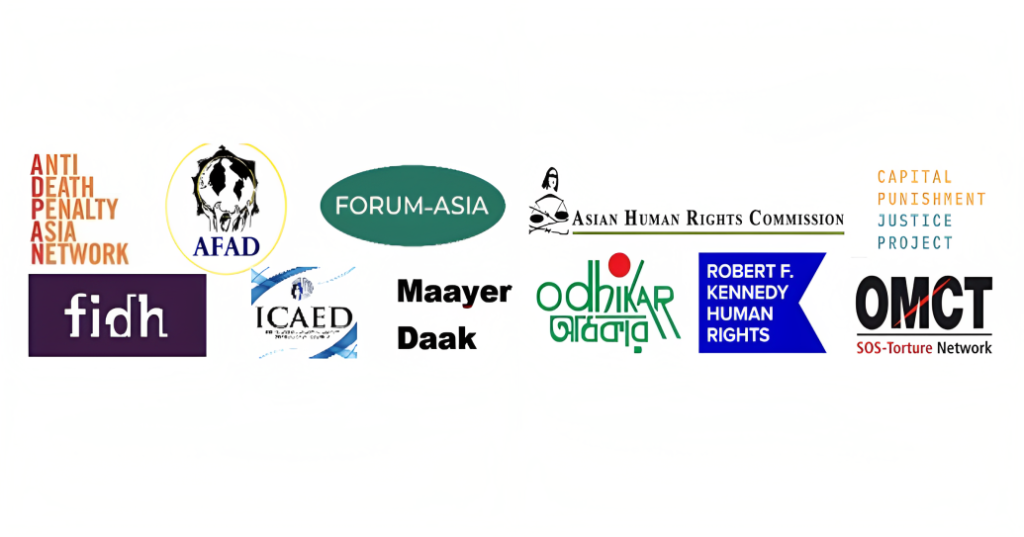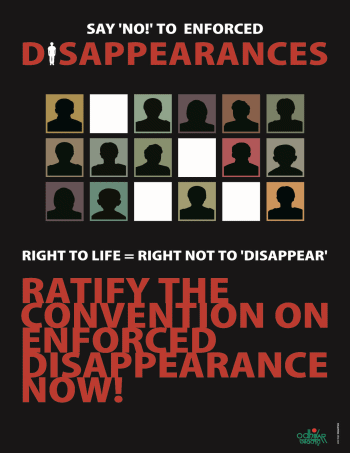A Joint Statement by Anti-Death Penalty Asia Network (ADPAN), Asian Federation Against Involuntary Disappearances (AFAD), Asian Forum for Human Rights and Development (FORUM-ASIA), Asian Human Rights Commission (AHRC), Capital Punishment Justice Project (CPJP), International Coalition against Enforced Disappearances (ICAED), International Federation for Human Rights (FIDH), Maayer Daak, Odhikar, Robert F. Kennedy Human Rights, and World Organisation Against Torture (OMCT) on the occasion of International Week of the Disappeared[1] 2023
BANGLADESH: Government must investigate all cases of enforced disappearance, stop acts of retaliation, hold perpetrators accountable, and ensure the security of victims’ families
Melbourne/ Hong Kong/ Manila/ Kuala Lumpur/ Bangkok/ Dhaka/ Geneva/ Paris/ Washington, D.C.; 25 May 2023: We, the undersigned organisations, are seriously concerned over the unabated enforced disappearances in Bangladesh amid the denial of access to justice for the victims. We also express our deep concern regarding the plight of the victims’ families, lack of accountability for such violations, and lack of due process and judicial safeguards to the victims and their families.
Enforced disappearances are a crime against humanity as defined in the Rome Statute of the International Criminal Court, to which Bangladesh is a party. Enforced disappearances undermine the rights to life, freedom of speech, freedom of thought and conscience, freedom of religion, and freedom of association. Enforced disappearances are a tool of state oppression. Victims of enforced disappearance are often tortured and fear for their lives at all times as they are placed outside the protection of the law. The families of the disappeared suffer immeasurable loss, not only psychologically as they endure the trauma of having to grieve without healing and closure, but also socio-culturally and economically.
The incumbent government of Bangladesh has systematically utilized law enforcement agencies and security forces to use enforced disappearance as a tool to suppress political opposition and silence dissent. Since the Awami League came to power in 2009, acts of enforced disappearance have become widespread, and such crimes continue to take place with blatant impunity. Regrettably no visible action has been taken by the government to cease this practice and hold perpetrators accountable.
Enforced disappearances continue to occur in the country despite a reduction in numbers since the US government imposed sanctions on the Rapid Action Battalion (RAB) and seven of its former and current top officials for alleged gross human rights violations in December 2021. Harassment and intimidation by the government of family members of the disappeared victims continue despite repeated calls by United Nations (UN) human rights experts and international human rights organizations to immediately stop retaliation against the families of the disappeared victims and human rights defenders.[2] Instead of taking steps towards accountability, the authorities have launched a campaign of threats and intimidation against families of victims of enforced disappearances and human rights defenders.[3]
Odhikar documented 21 cases of enforced disappearance in 2022 and eight more cases in the first three months of 2023. Documented incidents show that recently disappeared individuals have been missing for shorter time periods before being produced by law enforcement officials, arrested, and charged with offenses, including charges of terrorism under the Anti-Terrorism Act, 2009.
The UN Working Group on Enforced or Involuntary Disappearances (WGEID) has repeatedly urged the Bangladeshi government to provide information, including replying to its related general allegations transmitted after its 125th session in September 2021. The WGEID also called on Bangladesh to launch independent and impartial investigations into allegations of enforced disappearances perpetrated by the RAB.[4] The government has not responded to the calls made by the WGEID in relation to the general allegations and urgent appeals on various grounds, including the whereabouts of the disappeared persons and their right to life and liberty.
For the first time, on 15 May 2022, the government of Bangladesh responded to enquiries by the WGEID by submitting information sought on Bangladeshi cases. However, the information provided by the government was inadequate. The government wrote to the WGEID arguing that it is “unlawful to arbitrarily consider any missing [person’s] case as enforced disappearance”. The government specifically mentioned that the term “enforced disappearances” has been used with the obvious intention of maligning the government and its achievements.
We, the undersigned organizations, call on the Bangladeshi government to ensure an enabling environment where victims’ families and human rights defenders can carry out their legitimate activities in a safe and conducive environment without any threats, intimidation, or fear of reprisals. Bangladesh must ratify the International Convention for the Protection of All Persons from Enforced Disappearance recognizing the competence of the UN Committee on Enforced Disappearances, adopt national legislation criminalizing enforced disappearances, and conduct independent and impartial investigations into such serious allegations, in accordance with international law.
We urge the UN Human Rights Council (HRC) to use all tools at its disposal to pressure the Bangladeshi government to end enforced disappearances and bring perpetrators to justice. The HRC should also call on the authorities to conduct independent and impartial investigations into all allegations of enforced disappearances and ensure justice to victims and their families, as well as to respond positively to requests by the WGEID to visit Bangladesh.
On the occasion of the International Week of the Disappeared, we remember and pay tribute to victims of enforced disappearances and reiterate our commitment to stand in solidarity with the families of the disappeared in the struggle towards a world without disappearances.
—–
Organisations signed:
- Anti-Death Penalty Asia Network
- Asian Federation Against Involuntary Disappearances
- Asian Forum for Human Rights and Development
- Asian Human Rights Commission
- Capital Punishment Justice Project
- International Coalition Against Enforced Disappearances
- International Federation for Human Rights
- Maayer Daak
- Odhikar
- Robert F. Kennedy Human Rights
- World Organisation Against Torture
[1] Every year in the last week of May, organizations formed by family members of the disappeared persons commemorate International Week of the Disappeared (IWD) in different countries around the world to remember the disappeared, address the dark history of this crime, shed light on recent cases of enforced disappearances, and illuminate the ongoing struggle for truth and justice. The IWD was first observed in 1981 by a Latin American organization called the Federation of Associations for Relatives of the Detained-Disappeared (FEDEFAM), which was formed with the relatives of the disappeared. Since then, people’s organizations in different countries of the world have been observing this week in memory of the disappeared persons. The observation of IWD is a painful reminder that families await information on the whereabouts and fate of their loved ones and that disappeared persons are waiting to be freed from unknown places where they are wrongfully kept.
[2] https://www.ohchr.org/en/
[3] Daily Star, 14 January 2022; https://www.thedailystar.net/
[4] A/HRC/51/31, Report of the Working Group on Enforced or Involuntary Disappearances





